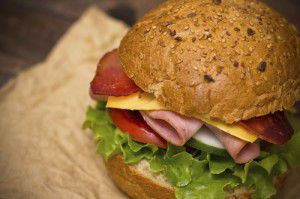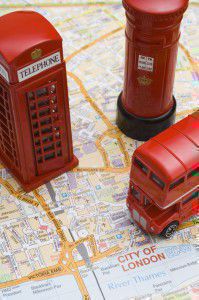A Hungry Conundrum
Learning a language is one thing… but what happens when that language changes depending where in the country you happen to be standing? That’s the subject of today’s blog post from Kelly – if you’ve encountered any of these regional confusions, we’d love to hear about them!
When is a roll a cake?
Before you break out your finest John Shuttleworth impression in fear of pudding before main, there is actually a very good answer to this.
Because unless you’ve never ventured further than your local shops and the thought of travelling to the next borough, town or neighbourhood fills you with a sense of dread, you’ve probably noticed that local words for things vary.
We don’t necessarily mean profound things like finding yourself receiving a chocolate biscuit when you asked for a custard cream (no complaint there really but still, confusing), but honestly, there is a minefield of potential outrage and disappointment out there if you’re not sure what you’re asking for.
Be careful where you ask for a ride, for example.
Back to our conundrum.
Escaping the Smoke
 When I left that there London many years ago from the pigeon-infested Victoria Coach Station on a one-way journey to Yorkshire, I’m pretty sure in my possession was a copy of Kerrang, a selection of confectionary, and a bread roll containing cheese and pickle.
When I left that there London many years ago from the pigeon-infested Victoria Coach Station on a one-way journey to Yorkshire, I’m pretty sure in my possession was a copy of Kerrang, a selection of confectionary, and a bread roll containing cheese and pickle.
Somewhere along the M1 that innocent-sounding sandwich was eaten, but had it remained intact, a magical thing would have happened to it. For on the journey North, it would have transformed from a roll, to a batch, to a cob, perhaps to a scuffler (I forget the exact National Express route…) before finally settling on being a breadcake.
In Britain, even wheat-based products have identity crises.
How do you say…
English is a diverse language for both native and non-native speakers alike, but think how much more embarrassing it is for a native speaker not being able to order something in their own country in their own tongue. We normally reserve such ridicule for when we travel abroad unprepared, in the arrogant but not-so-naive knowledge that English is spoken everywhere. But on our own doorstep, a quick weekend away can mean an unwanted education in local colloquial vocabulary.
Perhaps it would be easier to stick to the tourist move of pointing at the menu and blinking mutely.
 Another area of confusion could be the names for mealtimes. There is a fond memory of a misunderstanding over tea and dinner time. An offer of tea to a friend was met with an expectation of milk, sugar, and possibly biscuits, but when the option presented was tuna and sweetcorn, it was rapidly declined. With a horrified expression that said, ‘who are you people? What are you doing to the sanctity of the cup of tea???’, a friendship was on the brink. Because breakfast, lunch and dinner can also be breakfast, dinner and tea, depending where you are in our humble isle. (The tuna and sweetcorn was for a jacket potato, in case you were wondering).
Another area of confusion could be the names for mealtimes. There is a fond memory of a misunderstanding over tea and dinner time. An offer of tea to a friend was met with an expectation of milk, sugar, and possibly biscuits, but when the option presented was tuna and sweetcorn, it was rapidly declined. With a horrified expression that said, ‘who are you people? What are you doing to the sanctity of the cup of tea???’, a friendship was on the brink. Because breakfast, lunch and dinner can also be breakfast, dinner and tea, depending where you are in our humble isle. (The tuna and sweetcorn was for a jacket potato, in case you were wondering).
And another thing…!
While we’re on our home-away-from-home soapbox, can we take this opportunity to complain about the options available for a ‘pattie’ in your local fish and chip shop? Because again, depending on where you go, this could be fish, potato, fish and potato, potato in a mixture resembling bubble and squeak… There are probably more variations too, and one place we really don’t want to be confused is our chippy. Next you’ll be debating if the perfect side is mushy peas, curry sauce or gravy, and it’s all too delicate a subject for us to deal with without serious, in depth thought. To quote Hot Pie, “you cannot give up on the gravy.”
See? Now look what’s happened. We’re hungry and we want pie. But when is a pie not a pie?
That’s it. Time for a pub lunch.
Wetherspoons, anyone?
Kelly
Say what? 10 English expressions you might not have heard before
Here at EuroTalk, we love learning languages, and between us we speak quite a range, including Spanish, Hungarian, Russian, Japanese, German, Portuguese, Latvian, Slovak and more. But one language that the Brits in the office tend to forget about is our own – English.
Recently, we’ve had several conversations about the English language, usually inspired by one of our colleagues from overseas asking us what we mean when we use a particular word or phrase. Then Ioana found this article about British slang phrases and wanted to know how many of the listed expressions we use on a regular basis (quite a few, actually).
We thought this might make quite a fun blog post, so here are just a few of the English words our colleagues have discovered since arriving in the UK, along with others that we Brits feel everyone should know…
Pantomime
Discovered by Richard and Pablo
A pantomime (or ‘panto’ for short) is a very British tradition; it’s a musical comedy play performed each year over the Christmas and New Year period. Each town has its own panto, which is usually based on a children’s story and features certain conventions, including the pantomime dame and audience participation (‘he’s behind you!’ etc). It’s something that anyone who’s grown up in Britain tends to take for granted, and is surprisingly hard to describe, as we discovered earlier this week when the guys said, ‘What’s a pantomime…?’
Toad in the hole
Contributed by Gloria
A traditional British dish, consisting of sausages baked in Yorkshire pudding batter. Tastier than it sounds – and there are no toads in it, so we’re not quite sure how it got its name.
Food baby
Discovered by Ioana
We think this might actually originate from the USA, but put simply, a food baby is when you’ve eaten so much that you look a bit like you might be expecting. It’s also Ioana’s new favourite expression.
Numpty
Contributed by Amy
This is basically an affectionate way of calling someone an idiot. If you hear someone say, ‘No, you numpty!’ it means you’ve got something wrong, but don’t be too offended – there are far worse things they could call you. (Another version of this is calling someone a muppet.)
In the doghouse
Discovered by Symeon
If someone’s in the doghouse, it means they’re in trouble, just like a dog that’s been kicked out of the house and made to sleep outside.
Pardon my French
Contributed by Safia
Confusingly, this has nothing to do with speaking other languages. In fact, it’s a way of apologising for swearing, in an attempt to pretend the rude words are a foreign language, even though everyone knows they aren’t. It’s thought the expression originates from the 19th century, when people actually did apologise for using French words, assuming that whoever they were talking to didn’t understand.
Pigs in blankets
Discovered by Franco
Enjoyed particularly as part of Christmas dinner, pigs in blankets are small sausages wrapped in bacon. And they’re delicious. Fun fact: pigs in blankets are known as ‘kilted sausages’ in Scotland.
In a pickle
Contributed by Nat
This one derives from Shakespeare’s The Tempest, and means to be in a tricky situation or ‘a spot of bother’ (another English phrase for you, there).
Snigger
Discovered by Ioana (again)
Sniggering is laughing – but not in a nice way. A snigger is a quiet laugh, often under your breath or behind a hand, at the expense of someone else. We don’t recommend it; it’s mean.
Bodge
Contributed by Luke
Not to be confused with ‘botch’, which means to do something very badly, to ‘bodge’ something is to fix or build something temporarily, using whatever materials you happen to have lying around. The result may not look great, but it isn’t necessarily bad – in fact a bodge job is usually a sign of resourcefulness.
Does anyone else have any great English words you think everyone should know? Or have you learnt a fun English expression you’d like to share? Let us know in the comments 🙂

